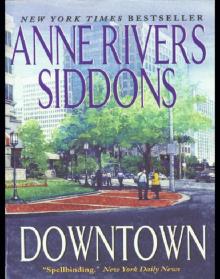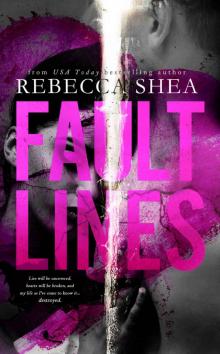- Home
- Anne Rivers Siddons
Homeplace Page 21
Homeplace Read online
Page 21
“Never ask for me unless it’s a dire necessity,” he had cautioned her. “Old Dorothy Blair is the self-appointed stringer for all three major news networks.”
“Oh, that’s too bad, honey,” the redoubtable Miss Blair said to Mike when she phoned. “You tell your daddy we all hope he feels better real soon. And you come to see us, hear? I hear you’ve turned into a mighty pretty girl, but it looks like I’ll never get the chance to see for myself.”
“I will, thanks, Miss Blair,” Mike said, making a hideous grimace at the old woman over the telephone. “And I’ll tell Daddy you asked after him.”
“Old trout,” she said under her breath, sitting on the edge of her bed and staring out at the thick gray day. Then she shook her head. There had, after all, been nothing in Dorothy Blair’s voice but interest and kindness. The air was as sullen and freighted with unshed rain as a swollen cow’s udder, and the dropping barometric pressure combined with disappointment at not seeing Bayard Sewell that afternoon and unaccustomed shame at the lie she had told Sam Canaday about her writing to make her feel nervy and prowling with undischarged emotion. Why in God’s name had Bayard had to say she was writing? He could have said anything else; he could, preferably, have said nothing at all.
J.W. Cromie’s tall figure appeared around the corner of the garage, dragging the rotating lawn sprinkler, and on impulse Mike got up and went downstairs and wrapped the plate of fudge in plastic wrap and took it back to the back fence, where J.W. was setting up the sprinkler. She had paid as little notice to him as to anyone else except Bayard Sewell in the past weeks; could not, in fact, remember the last conversation she had had with him. The indignation she had felt at J.W.’s apparent espousal of, or at least collusion in, his own indenture to John Winship had, somehow, ceased to prickle at her. She supposed it was a part of the same overall gentling of her attitude toward Lytton and everything connected with it that the affair had precipitated. He turned at the sound of her footsteps, and she smiled and held out the platter.
“I made some fudge, and I can’t eat it all,” she said. “I thought I remembered you had an incorrigible sweet tooth.”
“Yes’m, sure do,” he said, and took the platter, looking not quite into her face. “Appreciate it, sure do. I’ll have me a piece after I get this here sprinkler to going.”
He did not bend to set up the sprinkler, but did not say anything else, and she realized that he was waiting for her to end the encounter and go back into the house. She stood there with him in the hot, thick day, not sure what it was that she waited for, and then she took a deep breath and said, “I think I owe you an apology, J.W. That business with the sit-ins … it got you in a lot of trouble here, didn’t it? I never meant to do that.”
He sighed and put the platter down in the shade. Finally, he looked directly at her.
“No’m,” he said. “I know that. You done right by your lights. You meant to do good by me. Look like I just ain’t cut out for no liberation. Mama told me I ain’t.”
“But still—you made a start. J.W., you took the first step, you made a change in things. Why on earth did you just give up when things got a little tough in Atlanta and come back here? This is nowhere.”
“This here what I knows. This here really all I does know, Miss Mike. This suit me all right, I reckon.”
“You’re no more free right now than you were in 1964,” Mike said. “J.W., you could be really free by now; you could have …”
His head came up, and there was a brief flare of something savage in his opaque eyes.
“You ain’t ever thought what we s’pose to do after we free, is you? Yes’m, now I can order me anything I wants in any restaurant in the world. I just cain’t pay for it.”
“You have to earn it,” Mike cried. “You have to go somewhere else and earn it! My God, J.W., I did it. Look at … look at Charlayne Hunter Gault; she’s just our age; she got out; she earned herself a place …”
“I looks at Charlayne Hunter Gault a lot,” J.W. said fiercely and evenly. It was a tone she had never heard in his voice, not even before she had left home, twenty years before. “She had the whole movement behind her.”
“Well, it would have been behind you, too. That was the whole point of it.”
“No’m. Difference is, the movement be behind her an’ I be behind the movement. It a big difference, Miss Mike.”
“Oh, for God’s sake,” Mike exploded. “Stop with the Miss Mike crap. I’m from this town just like you; the same folks were mad at me as were mad at you. And I don’t go around in sackcloth and ashes with my eyes on the ground, thanking them for the scraps from their tables. I give it right back to them.”
J.W. smiled. It was not a cheerful smile. It was feral, contemptuous. When he spoke, the slow, thick blackness was gone from his speech.
“Yeah, you from Lytton too. Just like me. Except you left it when it got hot, Mike. Ran right on out of here and married you a rich Yankee. Most of us, we had to stay. This was the only brier patch we had. And you don’t spray the brier patch with Agent Orange if you need it to hide in. What do you know about staying?”
She was silent. The unfairness of it smote her. She had had no choice—had she? Did he really think she had chosen to run? Then she said, “But why on earth did you come back to this house? To him? He was furious with you; don’t you see that this indentured servitude he’s put you in is his way of punishing you?”
He looked up at the big house, then back at her.
“He was good to Mama,” he said slowly. “To Mama and me both, when I was little. He’s still good to me lots of ways you don’t know about. I’m not going to forget that. Nothing that happened later can change that. This job he gave me, this place to stay … you call it punishment. Looks more like … atonement to me. You can slap down a man’s punishment, and you should, but it’s a real sin to refuse his atonement. Looks to me like you doin’ a lot of slapping, Mike.”
He turned and walked away toward the house, carrying the platter. At the foot of the garage stairs, he turned and smiled at her again. The remembered sweetness struck her heart anew. “You make fudge nearly ’bout as good as a nigger, Mike,” he called.
Mike grinned back, finally. The grin had to work its way around a cold salty tightness in her chest, but by the time it reached her mouth it tasted as strong and free as the smile of a young girl she had known twenty years before.
“Sucks to you, J.W. Cromie,” she yelled after his retreating figure.
“Same to you,” floated back on the still, empty air.
Sam brought her father back an hour later, just as the thunderstorm that had been growling and muttering in the west broke over Lytton. The air inside the house went suddenly dark and strange, and the wind blew silver sheets of rain past the windows and against the front and side porches. The smell of warm, soaking earth mingled with the acrid, hellfire smell of ozone as a bolt shot home somewhere near, and Mike flew, barefoot and exhilarated, out into the wisteria bower to bring in the cushions. She had just unbound her hair and was toweling it dry when they burst into the kitchen from the garage.
“Come in before you drown,” she said, holding the door while her father wheeled himself up the ramp into the room. He was not wet, but Sam Canaday, following with a disreputable dripping umbrella, was streaked and spotted with rain.
“Like a cow pissing on a flat rock,” John Winship said. “Do the homeplace good. Lawns and scuppernong vines were looking pretty bad.”
His face was startlingly white in the dark room, paler than Mike had ever seen it, and there was a yellow pinch to his mouth that spoke of pain and the effort to control it, and the death that was spinning toward him like a star. But there were hectic splotches of color on his sunken cheeks, and his eyes had a knife-edge glitter. He carried his narrow death’s head high on the thin stalk of a neck, and a feverish ebullience shimmered in the air around him like an aura. From one of Priss’s long-ago English classes the image of Death as a reveler at a masquer
ade ball snapped into Mike’s mind. She recognized it: Poe’s “The Masque of the Red Death.” To waltz with her father at this moment, in his strange excitement, would be to dance with death. She shivered and flicked on the overhead light, and the room sprang into fluorescent whiteness, livid against the storm outside.
“Did you have a good trip?” Mike said. “What did the doctor say?”
“Said just what I thought he’d say, the old fool,” John Winship said, and his voice was stronger than she had heard it for weeks. “Said that little twinge last night was more likely gas and I’m not a bit worse than I was a month ago. Not much better, but no worse, either. Waste of time. Told Sam so. But I finally got to see what needs doing down at the homeplace, and I’m gon’ get J.W. right on that, and I got to thinking: ’stead of lying around looking at the goddamn TV every morning and evening, I think I’m gon’ start me a letter-writing campaign. Bury every newspaper and TV and radio station in a hundred-mile radius so deep in paper that they’ll have to pay attention eventually. Tell ’em how it feels to have a bunch of government sons of bitches just come and take your property, show ’em what a real Southerner does when some jackass tries to steal his land …”
“You know the DOT isn’t breaking any laws, Colonel,” Sam Canaday said mildly, his eyes on her father’s face.
“Then we’ll get the goddamned laws changed,” John Winship exclaimed. “I’ll write letters to every man jack in the goddamned legislature, too. Sooner or later they’ll have to do something about it just to shut me up.”
He turned to Mike, his eyes and cheeks burning. “Want to help out in the crusade, Micah?” he said, using her full name for only the second time she could remember since the night she left this house, twenty-two years before. “You can put some of that fancy journalism of yours to good use, for a change. Or you can just lick stamps, if you want to.”
“I … Daddy, do you really think you ought to …” Mike began. She wanted no part of the skewed, futile campaign, did not even want to hear about it. It could accomplish nothing; was as foolish and quixotic as the original windmill tilt. But he had not asked anything at all from her in the time she had been back, not even for a glass of water or an assist in the wheelchair. And though his effort to suppress the interest in his voice and eyes was visible, it was there.
“We better let Mike get on with her own writing, Colonel,” Sam said smoothly, before she could go on. “She’s got a living to make and bills to pay in New York, and she’ll have to hit the typewriter if we want to keep her around. Who knows, there might be a great American novel going on up there behind that closed door. Don’t want to distract her just when she’s going good.”
She shot him a look over her father’s head, mingled gratitude and annoyance. He had delivered her from a sticky situation with her father, but he was digging her deeper and deeper into the fiction of writing in the afternoons. Her unease at the charade was mushrooming. He caught the look and grinned blandly. John Winship nodded.
“Yeah, better let the genius perk along,” he said, apparently satisfied with Sam’s words. “Don’t need her, anyhow. Sam’s going to get me one of those transistor tape recorders, Mike, and I’m going to dictate, and he’s going to get it transcribed and sent off for me.”
“Well … good,” Mike said, looking again at Sam Canaday over her father’s mottled head. “Only what’s he going to do for help?” She knew that he did not have a secretary yet, and suspected that he could not afford one. “Why don’t you let Bay’s office do them for you?” she suggested, turning back to her father. “He’s got other help besides Miss Blair, and a whole mailroom, and you know he’d be more than glad …”
Her father dropped his eyes to his hands, folded in his lap. “Sam knows what’s going on with the DOT,” he said. “Don’t want Bay to have to mess with it.” There was something muted and mulish on his face. He did not look at either of them.
“It’s no problem,” Sam said. “Ouida Quigley at the post office is going to take the tapes home with her at night, and the Colonel is going to pay her a little something to type and mail them. She’s thrilled to get the money.”
“Well, then,” Mike said, looking from one to the other in the little strangeness. “I guess if the doctor says it’s okay, it is. He did say it was, didn’t he?”
“Oh, hell yes,” John Winship said loudly. “Said anything I feel like doing is okay with him.”
“Did he give you anything for the pain?” Mike asked.
“Don’t need anything,” her father said. “I told you it was just gas. Probably won’t come back. It was gone by this morning, anyway.”
Sam Canaday shook his head over the wheelchair. His mouth was grim. But his voice was even when he said, “Come on, Colonel. You know you promised you’d go straight to bed if I took you down to the homeplace. You don’t need to tire yourself out right off the bat if you’re going to take on the DOT single-handed. A deal’s a deal.”
“Okay. But I want you to come back here tonight after supper. We’ve got a lot of planning to do.”
“I’ll be here,” Sam said, and watched the old man out of the room.
He was back in a few minutes.
“He isn’t all right, is he?” Mike asked.
“No,” Sam said. “He isn’t all right at all. He’s in pain and he’s been in pain for some time, and it’s going to get worse before it’s over. He’s just too frail from the stroke to stand any more chemotherapy and surgery’s out of the question. The doctor gave him something stronger for the pain, and said he thought it would handle it for some little time … things could rock on like this for quite a while, apparently … but sooner or later it’s going to get bad.”
Mike’s throat felt dry, and her voice was scratched and stiff.
“How bad?”
“Hard to tell. Maybe no worse than a moderate amount of painkiller can handle. That’s what we have to hope for. That we don’t have to dope him into a coma and let him just lie there until he dies. That we can keep the pain manageable until it’s time for him to go.”
“How long … will that be?” Mike felt as though she were talking about something that was happening behind a thick pane of glass. The bell jar, which had been as dense with thoughts of Bayard Sewell and nothing else as a paperweight snowstorm, cleared enough to show her a distant, blurred landscape of mortality and smells and disorder and pain. “I … really didn’t know it was going to be like this.”
“What did you think it was going to be like? A segment on the six o’clock news? I don’t know how long it’s going to be. The doctor doesn’t know. A month. A year. How long isn’t the point. How well he can live until is.”
She was suddenly angry. “Then why in God’s name are you letting him screw up whatever time he has left with this stupidity about the DOT? Why did you even think of encouraging him to start this poor, useless letter campaign? You know it’s not going to make any difference; you know he can’t win. Why do you keep putting off the day he finds that out? It’s cruel, it’s terrible. I’m going to tell him it’s no use. Somebody needs to spare him at least this. He’s going to look like an awful fool to all those people …”
He moved so quickly across the linoleum that she hardly saw the motion. He leaned over her, his face pulled to the bone, his green eyes no longer sleepy, but leaping with fire.
“You fool,” he said, in a shaking near-whisper. “Don’t you see that this foolishness, as you call it, is the only thing keeping him alive?”
“Alive till what?” she hissed back. “Alive for what?”
“Alive until he doesn’t want to be anymore!” Sam Canaday looked as if he wanted to grasp her shoulders and shake her, and she stepped back a pace. “Alive till he wants to die, alive until he feels like he’s given this whole thing his best shot. Alive till he decides not to be. Goddamn it, Mike, it’s his land and it’s keeping him here on this earth, and you stay the hell out of it or you’ll truly have me to answer to!”
“I
don’t want him to hurt!” Mike all but shouted.
“Well, he’s going to hurt! Telling him he hasn’t got a snowball’s chance in hell with the Department of Transportation isn’t going to keep him from hurting.” He turned and walked across the kitchen to the garage door and turned back to her. “I don’t mean to be rough on you, Mike, but you don’t seem to be in touch with what’s going on with your father, and you haven’t since you got here. He’s dying of cancer and it’s going to hurt him before he does. It isn’t going to be fun to watch him do it. If you can’t handle that without its puncturing that famous detachment of yours, maybe you ought to go on back home and leave it to me and DeeDee. She ain’t much, but she knows what’s real.”
Mike started to flare at him, but instead leaned against the refrigerator. The scene in the kitchen, on top of the odd and disorienting interlude with J.W. that afternoon, had drained and somehow flattened her. It did not seem worth it to argue with Sam Canaday about the proper treatment of a dying father, and in any case, some small and surprised part of her far outside the bell jar suspected that he was right.
“Come on back about six and I’ll give you some supper,” she said in a smaller voice than she usually used with him.
“Thanks,” he said. “I’d like that,” and was gone into the last of the evening rain.

 Colony
Colony Nora, Nora
Nora, Nora House Next Door
House Next Door Homeplace
Homeplace Downtown
Downtown Peachtree Road
Peachtree Road Sweetwater Creek
Sweetwater Creek Fault Lines
Fault Lines Low Country
Low Country The Girls of August
The Girls of August Burnt Mountain
Burnt Mountain Islands
Islands